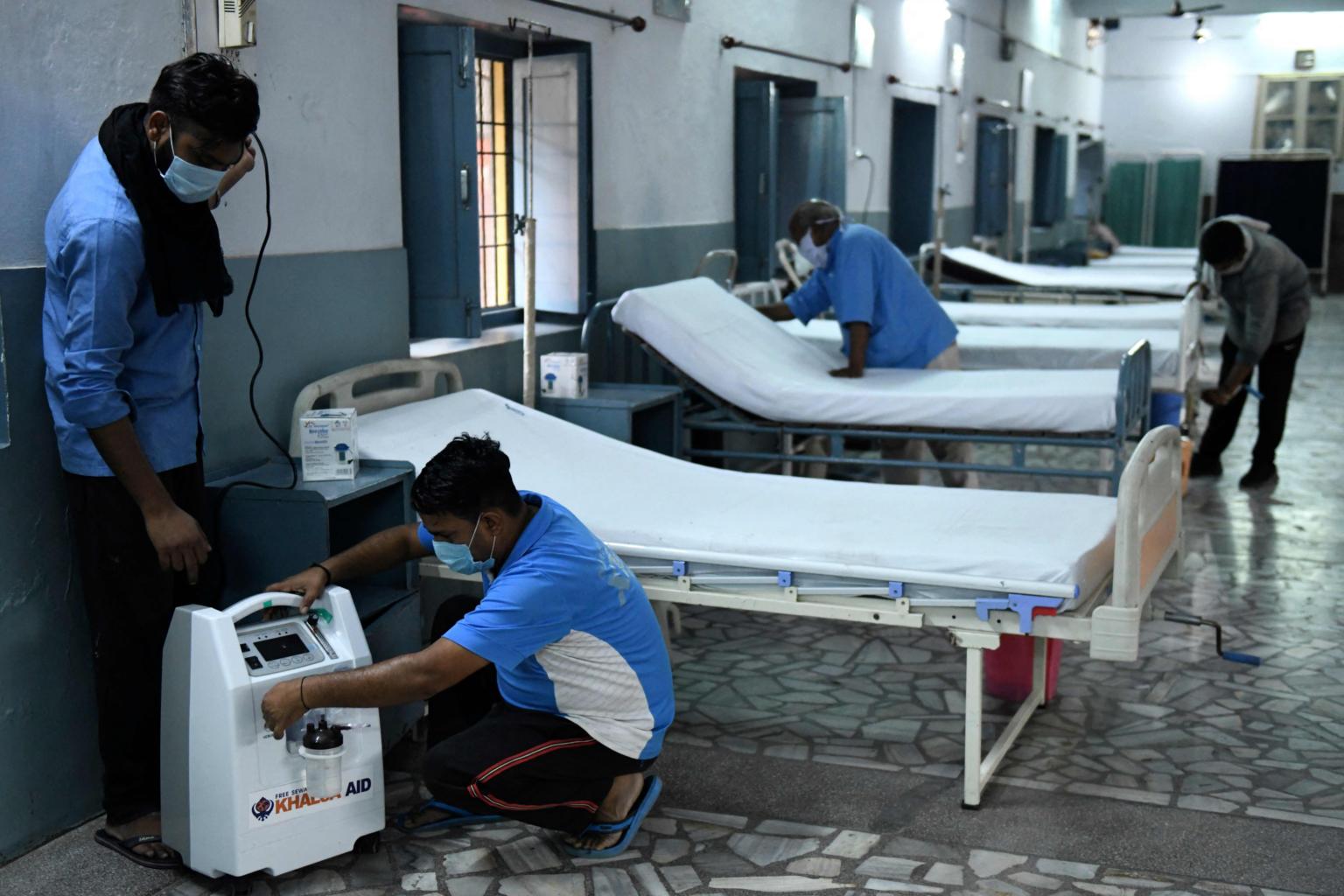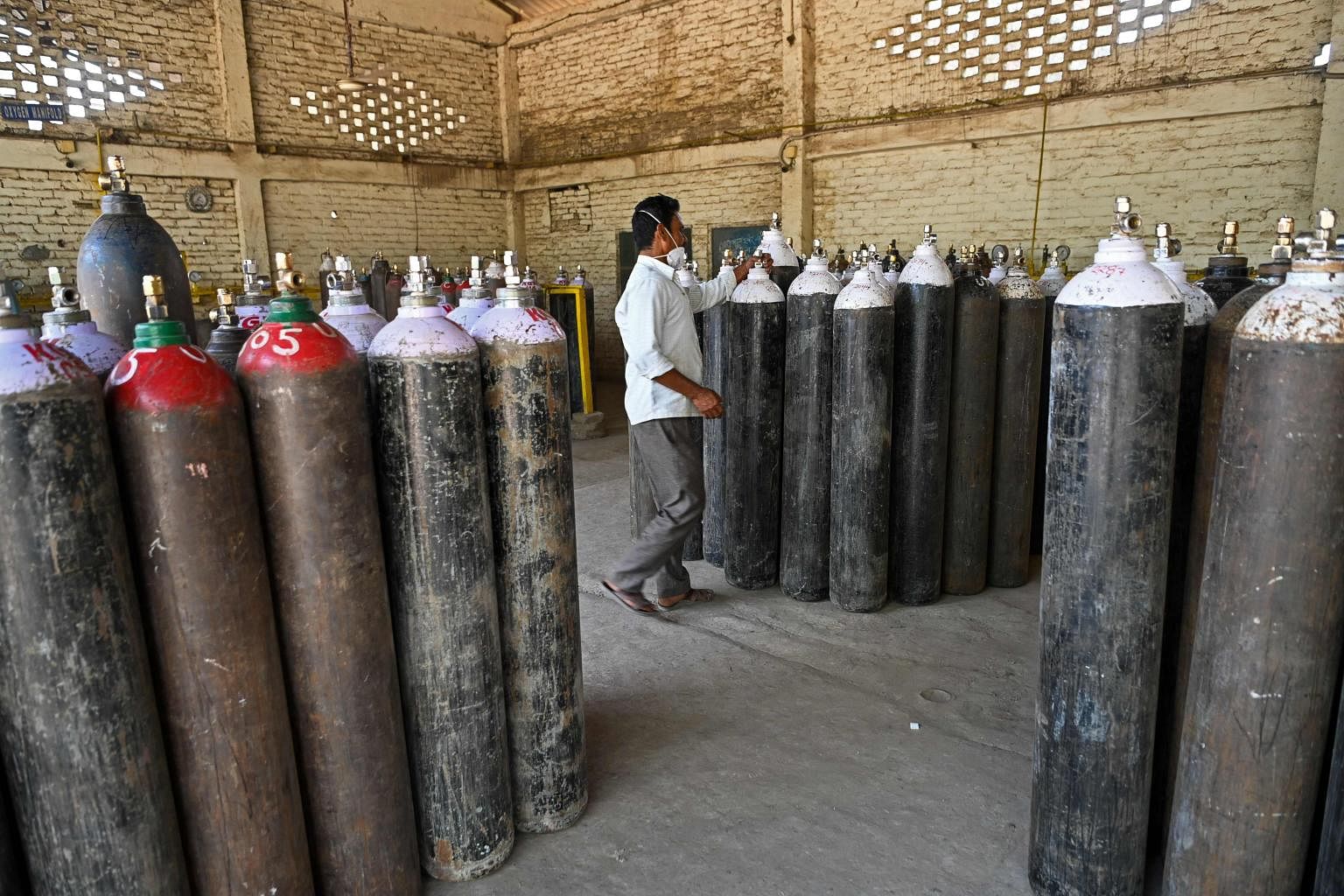Indian start-ups join hands to provide Covid-19 relief
Sign up now: Get insights on Asia's fast-moving developments

Employees of a charitable society check an oxygen concentrator machine placed near beds at a care centre in Amritsar, on May 7, 2021.
PHOTO: AFP
Follow topic:
BANGALORE - Several Indian start-up entrepreneurs are joining hands to ease the suffering caused by the second wave of Covid-19 infections in the country.
India is recording over 400,000 new infections and more than 4,100 deaths every day now.
Experts say much of the devastation is due to inadequate hospital capacity to accommodate the rising number of sick people, oxygen reserves running out in facilities from reputed private hospitals to village health centres, and the chaotic tussles to get everything from scarce vaccines to antibiotics.
Many entrepreneurs and businessmen in India have donated millions to volunteers and non-profit Covid-19 relief efforts but some have leaned in further. They are using their tech skills, business networks and operations acumen to build rapidly scalable virtual platforms for everything from medical tele-consultancy to physically sourcing essentials.
Nine months ago, Bangalore-based zero-food-waste entrepreneur Krishnan Kasturirangan and a core team of 10 other start-up entrepreneurs established StepOne, a technological platform with over 7,000 volunteer doctors. They offer online or phone consultation to Covid-19 patients in home isolation.
"We couldn't just sit back and watch people suffer without healthcare access. Our first aim was to ease the burden on existing hospital infrastructure by filtering out mild Covid-19 patients, who make up 80 per cent of the cases," said Mr Kasturirangan.
StepOne's screening system now works in tandem with government health systems currently used by 16 states.
Everyone who tests positive for the coronavirus in cities like Bangalore, Mumbai or Pune gets an automated call from the government, via StepOne, with questions about symptoms. At home or in hospital, they must key in their symptoms.
Non-medical volunteers then call those with moderate or serious symptoms back to verify details, and if needed, allot them a doctor for tele-consultation. If they need hospitalisation, the case is escalated to the government's bed allotment system.
As the second wave of infections peaks, Mr Kasturirangan said StepOne is working on an additional care protocol for moderate Covid-19 patients who need hospitalisation but are stuck at home due to non-availability of beds.
"We're trying to get doctors with Covid experience to stretch a patient's ability to survive until they get allocated a bed," he said.
Four other entrepreneurs led by Mr Lalit Pai, founder of Medwell Ventures and Cytecare hospitals, are focusing their attention on quickly increasing the number of oxygen-supported and critical care beds.
Their non-profit Humanist Centre for Medicine is now raising funds to build two temporary 50-bed units in Managed Covid Care Centres in Bangalore with oxygen concentrators for patients who have moderate Covid-19 symptoms. Each centre will cost $200,000 to build.
In Delhi, where hospitals are having to turn away breathless patients for want of oxygen, nine start-up founders from the Gurgaon suburb launched "Mission Oxygen" on April 23 to import 6,000 oxygen concentrators.

Last Thursday (May 6), the first shipment of 800 oxygen concentrators arrived from China, and were distributed to needy hospitals and nursing homes, said Mr Varun Aggarwal, founder of start-up Designhill, and trustee of the group, which calls itself Democracy People Foundation.
Their call for donations through crowdsourcing platform Ketto has received contributions from celebrities like cricketers Sachin Tendulkar and Shikhar Dhawan and Bollywood actors Alia Bhatt and Tapsee Pannu.
Another group of entrepreneurs, ACT Grants, is also trying to import and distribute 50,000 oxygen concentrators. Their dashboard for the demand and supply of oxygen concentrators shows that India needs 364,744 high- and low-flow oxygen concentrators but only 2,764 are currently deployed countrywide.
Believing that the long-term strategy to battle Covid-19 is through mass vaccination, a dozen other start-up founders set up IndiaVaccine in early April 2021 to map the 58,000 vaccination centres in Bangalore.
The two approved vaccines in India - Serum Institute of India's Covishield and Bharat Biotech's Covaxin - are in short supply today, even as everyone over 18 is now eligible to get the jab. Indians are thronging vaccination centres as their last defence against a severe case of Covid-19.
"But some popular vaccination centres run out fast, while smaller ones that don't get enough people end up wasting opened vials of vaccine," said Mr Nameet Potnis, a fintech entrepreneur and member of the core team of IndiaVaccine.
The tech platform collates data on vaccine availability in each centre from Cowin, the centralised government portal to book appointments for jabs, but has also mobilised around 2,000 volunteers - students, homemakers, corporate employees - to make phone calls to verify if the vials are indeed available or when they will be replenished.
"Our excitement is not about technological innovation but about ensuring that vaccination is inclusive. Next, we will widely distribute myth busters and scientific messages to educate people about vaccines," said Mr Kartik Parija of IndiaVaccine, also co-founder of Adori Labs, a media-tech platform that enables audio creators to be successful.
Unlike the first wave of the pandemic, when the poor and elderly were most affected, the second wave has scarred every Indian across class and age. A wider range of efforts from citizen volunteers, social workers and business folks is palpable today.
For instance, it was banker Berty Thomas' own struggle to book his vaccination appointment on Cowin that prompted the hobbyist programmer to write a software programme that alerts people as soon as a centre adds slots.
Indians over 18 can get vaccinated only by booking an appointment online on the Indian government's centralised portal. The high demand for vaccines and short supply has meant that slots are booked in a matter of seconds.
On April 29, Mr Thomas wrote a code that would issue phone alerts on the Telegram messaging app.
"Then you have to run to the website and book your slot instead of spending all day refreshing the portal hoping for open slots," he said.
In a week, he has tweaked the programme to work for 80 cities in India. Taking two weeks off from his day job, he is now building a tool for rural areas.
"It's just my way of extending my privilege and skills to help others," said Mr Thomas.

